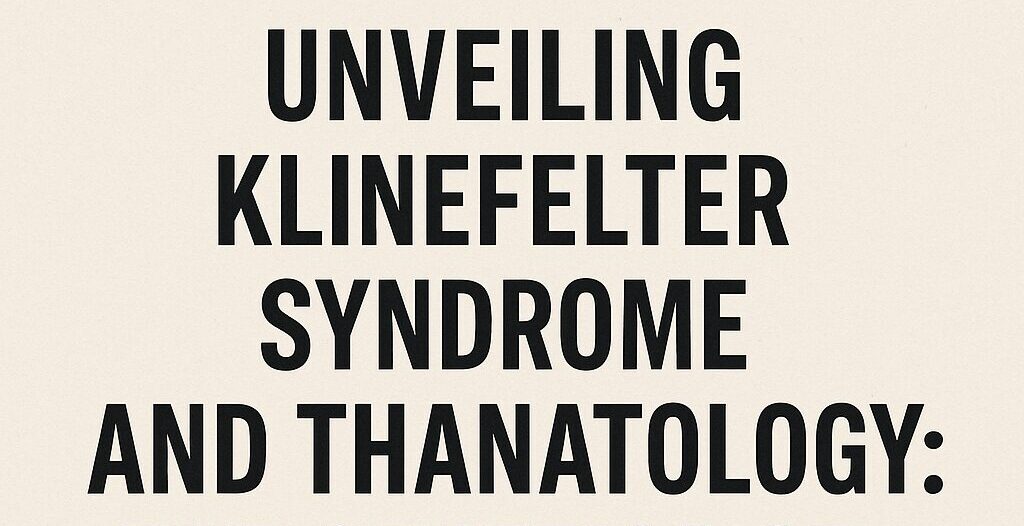Klinefelter Syndrome and thanatology would, on first impression, appear unrelated, one being based on genetics and the other the study of dying and death but both providing crucial information about human biology, psychology, and medicine. Whereas Klinefelter Syndrome influences individuals manner of living and development, thanatology delves into how people deal with the reality of death. In this article, the two shall be examined, their definitions, effects, and relationship in the larger picture of life sciences and human behavior.
What is Klinefelter Syndrome?
Klinefelter Syndrome (KS) is a genetic disorder that occurs in males, when a boy is born with an additional X chromosome usually 47,XXY rather than the normal 46,XY. It is known as the most frequent chromosomal disorder which is seen in about 1 in 500 to 1 in 1,000 newborn boys.
Causes:
Klinefelter Syndrome is not passed down but results from random mistakes when making reproductive cells. Chromosomal defects can result in differing developmental outcomes based on the number and arrangement of extra chromosomes.
Symptoms and Features:
Symptoms are not noticeable until puberty or beyond. Typical characteristics include:
- Decreased muscle tone and facial/body hair
- Increased breast tissue (gynecomastia)
- Above-average height
- Learning impairment, especially language and reading
- Infertility in males due to low sperm count
It can also affect self-esteem, socialization, and emotional control as a result of hormonal imbalance and developmental delay.
Diagnosis and Treatment:
Diagnosis is most often established using a karyotype blood test. Early diagnosis leads to improved results, particularly with treatments such as testosterone replacement therapy, speech and occupational therapy, and educational intervention. Although there is no treatment, medications can improve the quality of life.
Understanding Thanatology: The Study of Death and Dying
Thanatology is known as the scientific study of death, and all the practices surrounding them. It is derived from the Greek thanatos (death) and logos (study) thanatology discusses the physical, psychological, spiritual, and social dimensions of death.
Major Areas of Thanatology Are:
- Grief and Bereavement: Identifying how people deal with the loss of a loved one.
- Palliative and Hospice Care: Bringing comfort and support to the terminally ill.
- Death Education: Educating individuals, particularly professionals such as counselors and medical workers, on issues of death with the intention of promoting healthier outlooks.
- Cultural Perspectives on Death: Exploring how various societies and religions conceptualize and ritualize death.
- Ethics and End-of-Life Decisions: Investigating complicated issues like euthanasia, advance directives, and patients’ rights.
Relevance Today:
In an age where the world is becoming more dominated by medical progress and technological interventions, thanatology fills the space between life-sustaining care and quality end-of-life experiences. It is also instrumental in trauma healing, counseling, and maintaining families with terminal illness or shock loss.
Intersections Between Klinefelter Syndrome and Thanatology
Although Klinefelter Syndrome is not directly responsible for life-threatening complications in the majority of instances, individuals afflicted with it might experience psychological distress, social stigma, or infertility bereavement all of which could be treated using principles derived from thanatology.
For instance:
- Mental Health and Mourning the “Ideal Self”: Most individuals diagnosed with KS during adolescence or adulthood will grieve for lost opportunities like biological fatherhood, and for issues of identity, body image, and social belonging. These feelings can be worked through with thanatological support.
- End-of-Life Care: When patients with KS are diagnosed with terminal conditions or complications of related disorders (such as cancer or metabolic imbalances), thanatologists, hospice staff, and bereavement counselors are crucial in care and counseling both patients and relatives.
- Family Counseling: Parents undergoing a prenatal diagnosis of KS can also be helped through thanatological counseling of coping with feelings, anxieties, and life-care decisions.
Conclusion:
Klinefelter Syndrome and thanatology, though based in different disciplines, ultimately come together in their influence on human welfare. KS educates us regarding the significance of genetics and early intervention, and thanatology reminds us of the preciousness of life and the need for empathy when loss occurs. Both help healthcare professionals, patients, and families realize, heal, and live the complete gamut of human experience from birth to life and, ultimately, to death.





























